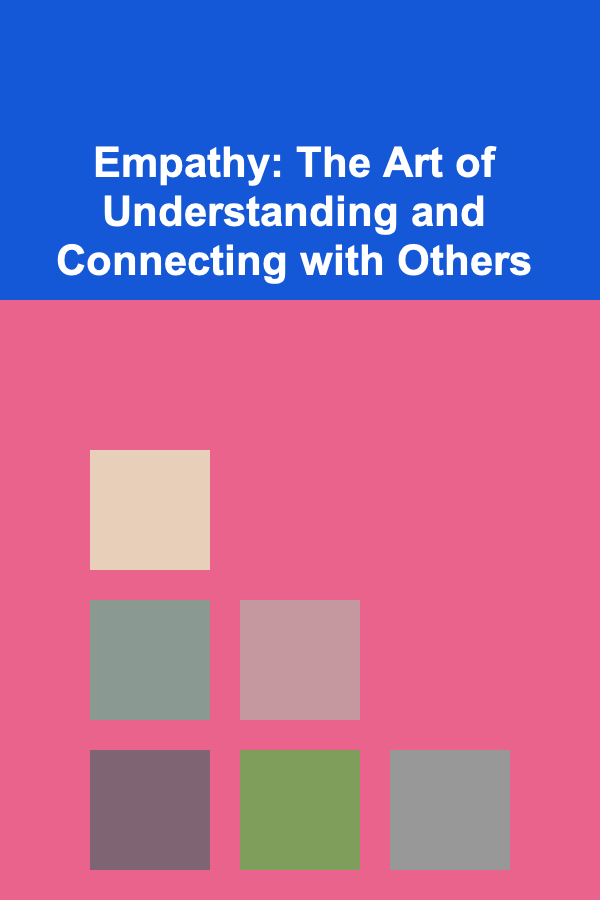
Empathy: The Art of Understanding and Connecting with Others
ebook include PDF & Audio bundle (Micro Guide)
$12.99$10.99
Limited Time Offer! Order within the next:

Empathy is a powerful and transformative skill that allows individuals to deeply connect with others, understand their emotions, and foster meaningful relationships. In today's fast-paced and often disconnected world, empathy is more important than ever, whether in personal relationships, workplaces, or broader societal interactions. Understanding and practicing empathy can bridge gaps, resolve conflicts, and create a culture of understanding and support.
In this article, we will explore what empathy is, why it matters, how to cultivate it, and its profound impact on human connections. This is an actionable guide designed not only to offer theoretical insights but also to provide practical steps you can implement in your life to develop and enhance empathy.
What is Empathy?
At its core, empathy is the ability to recognize, understand, and share the feelings of another person. It's often confused with sympathy, but empathy is a deeper emotional experience. While sympathy is feeling pity or sorrow for someone, empathy involves stepping into their shoes, feeling what they feel, and seeing the world from their perspective.
Empathy encompasses three primary components:
- Cognitive Empathy: The ability to understand another person's thoughts, perspectives, or mental state. It's about grasping why someone thinks or feels the way they do.
- Emotional Empathy: The capacity to physically feel what someone else is experiencing emotionally. When you feel the sorrow or joy that someone else feels, you're engaging in emotional empathy.
- Compassionate Empathy: This goes beyond understanding and feeling; it's about taking action to help. Compassionate empathy leads to a desire to alleviate another person's suffering or offer support.
Why Empathy Matters
Empathy is vital in many areas of life. It builds the foundation for effective communication, trust, and cooperation. Here's why empathy is so important:
1. Improves Communication
Empathy allows us to listen without judgment and respond thoughtfully. By tuning into what others are saying and how they are feeling, we can avoid misunderstandings and foster more productive, respectful conversations. Effective communication, built on empathy, allows for healthier debates and discussions and helps prevent conflicts from escalating.
2. Strengthens Relationships
Empathy is the glue that binds relationships, whether in a personal or professional context. When you show empathy, others feel valued, understood, and respected. This creates a sense of security and emotional intimacy. In romantic relationships, for example, empathy enables partners to support each other during difficult times, making the relationship stronger.
3. Enhances Emotional Intelligence
Empathy is a core component of emotional intelligence (EQ). People with high emotional intelligence are better at recognizing and regulating their own emotions, as well as understanding the emotions of others. This makes them more adaptable, resilient, and capable of navigating complex social situations.
4. Promotes Conflict Resolution
Conflicts arise when people's needs, beliefs, or feelings are not being recognized or respected. Empathy helps identify the root causes of conflict, as it allows individuals to see things from the other person's perspective. This is crucial in finding common ground and resolving issues without aggression or misunderstanding.
5. Fosters Compassion and Kindness
Empathy leads to compassionate actions. When we understand the pain or joy someone else is experiencing, we are more inclined to offer help, support, or kindness. This not only benefits the individual but also creates a ripple effect that promotes a more compassionate and connected society.
How to Cultivate Empathy
Empathy is not an inherent trait that some people are born with and others are not. It is a skill that can be developed and nurtured over time. Here are some actionable steps to help you cultivate empathy in your everyday life:
1. Practice Active Listening
One of the most important ways to show empathy is through active listening. Active listening means fully concentrating on the speaker, understanding their message, responding thoughtfully, and remembering what was said.
- Listen without interrupting: Let the person speak freely before you respond.
- Make eye contact: This shows you are present and engaged in the conversation.
- Avoid judgment: Suspend your own opinions and assumptions to truly hear the other person's perspective.
- Reflect and clarify: Repeat back what you've heard in your own words to ensure understanding.
By listening with intention, you show the speaker that you care about their feelings and are willing to invest time in understanding them.
2. Put Yourself in Someone Else's Shoes
The essence of empathy is the ability to see the world from someone else's perspective. When interacting with others, try to imagine what they might be feeling or thinking. This is especially important when dealing with people who have different experiences or worldviews.
Ask yourself:
- What are they going through right now?
- How would I feel if I were in their situation?
- What do they need from me in this moment?
This shift in perspective allows you to respond in ways that are more compassionate and supportive.
3. Ask Questions and Seek Understanding
Empathy involves curiosity about others' experiences and emotions. When appropriate, ask open-ended questions to understand the person's point of view better. For example, instead of saying "I know how you feel," try asking, "Can you tell me more about how you're feeling?"
Asking questions not only demonstrates your interest but also gives the other person an opportunity to express themselves fully, which is crucial for building a deeper connection.
4. Be Present
In our digital age, it's easy to become distracted during conversations, especially when smartphones and other devices are involved. To practice empathy, be fully present with the person you're speaking with. Put away distractions, give them your undivided attention, and engage fully with their words and emotions.
By being present, you signal that the person matters to you and that their emotions are important. This fosters a deeper connection and allows you to respond more authentically.
5. Recognize and Manage Your Own Emotions
Empathy requires self-awareness. To understand and connect with others' emotions, you first need to understand your own. Recognize how your emotions affect your interactions with others, and strive to manage your emotional responses.
For example, if you're feeling stressed or frustrated, take a moment to calm yourself before engaging with someone who may be vulnerable or in need of support. Being mindful of your own emotions helps you be more present and responsive to others.
6. Engage in Empathy-Building Activities
There are several practices and activities that can help you enhance your empathetic abilities:
- Volunteer work: Volunteering for causes that support underrepresented or marginalized groups can deepen your understanding of others' struggles and needs.
- Reading diverse literature: Reading books and stories that explore different cultures, experiences, and emotional journeys helps broaden your perspective and increase your empathy.
- Mindfulness and meditation: Practicing mindfulness helps you become more aware of your own thoughts and emotions, making it easier to understand others' feelings.
The Impact of Empathy on Society
Empathy has the power to transform entire communities. On a larger scale, when empathy is practiced collectively, it creates a more compassionate and just society. Here's how empathy can impact society:
- Reduces discrimination: When we empathize with people from different backgrounds or walks of life, we are less likely to judge or discriminate against them. Empathy promotes inclusivity and acceptance.
- Encourages collaboration: In workplaces, schools, and communities, empathy encourages collaboration and cooperation. People are more willing to work together when they feel understood and valued.
- Strengthens social bonds: Empathy strengthens the social fabric by fostering trust, mutual respect, and understanding. This leads to more harmonious relationships both within families and between diverse groups of people.
- Creates a culture of care: Empathetic societies prioritize the well-being of their members, ensuring that everyone has access to resources, care, and support when needed.
Conclusion
Empathy is not just a nice-to-have trait; it's an essential skill for building meaningful relationships, resolving conflicts, and fostering positive social change. By actively listening, stepping into others' shoes, and practicing compassion, you can create stronger connections with those around you and contribute to a more understanding and caring world.
Developing empathy is an ongoing journey that requires conscious effort, but the rewards are immense. Not only will you experience more fulfilling relationships and greater emotional intelligence, but you will also play a role in creating a society where individuals are valued, understood, and supported.
Empathy is truly the art of understanding and connecting with others -- a powerful tool that, when cultivated, enriches our lives and the lives of those around us.
Reading More From Our Other Websites
- [Home Soundproofing 101] How to Soundproof a Home Theater for an Immersive Experience
- [Home Family Activity 101] How to Combine Family Home Improvement and Comic Book Creation: Mural Making!
- [Screen Printing Tip 101] Best Practices for Screen Printing on Non‑Fabric Surfaces Like Wood and Glass
- [Small Business 101] How to Implement a Zero‑Waste Policy in a Small Café Without Disrupting Service
- [Home Rental Property 101] How to Understand the Rent Zestimate Process for Your Property
- [Mindful Eating Tip 101] Best Mindful Eating Strategies for Managing Nighttime Snacking in Shift Workers
- [Home Space Saving 101] How to Create the Illusion of More Space in Small Rooms
- [Organization Tip 101] How to Keep Your Computer Desktop Organized
- [Home Rental Property 101] How to Choose Between Short-Term and Long-Term Rentals for Your Home
- [Personal Investment 101] How to Use Options Trading for Advanced Investment Strategies

How to Create a Vision Board in Your Study Space
Read More
How to Help Small Businesses with Financial Forecasting
Read More
How to Set a Date for Reopening Your Time Capsule
Read More
The Ultimate Guide to Lowering Mortgage Payments Through Refinancing
Read More
How To Support Children's Expressive Language
Read More
How to Reduce Your Risk of Gallbladder Issues
Read MoreOther Products

How to Create a Vision Board in Your Study Space
Read More
How to Help Small Businesses with Financial Forecasting
Read More
How to Set a Date for Reopening Your Time Capsule
Read More
The Ultimate Guide to Lowering Mortgage Payments Through Refinancing
Read More
How To Support Children's Expressive Language
Read More